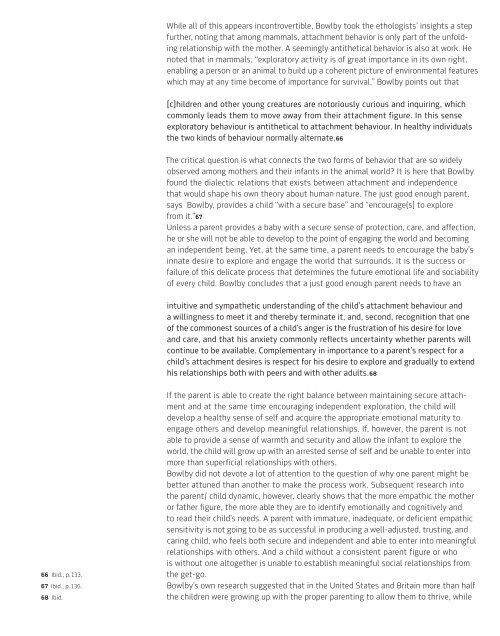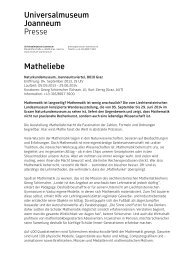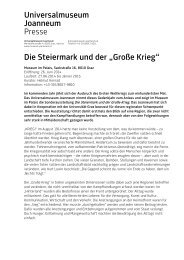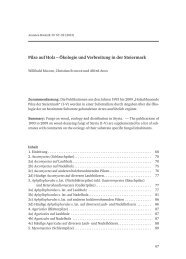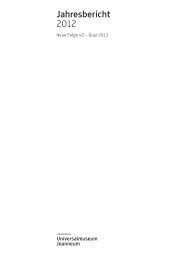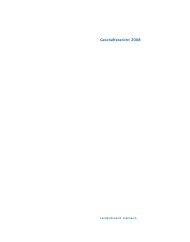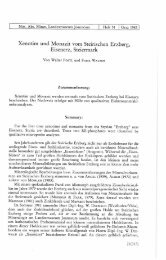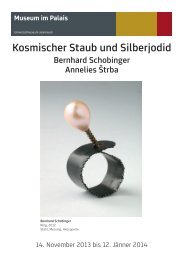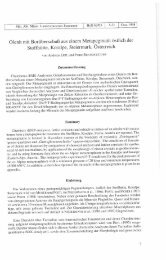Human Condition - Universalmuseum Joanneum
Human Condition - Universalmuseum Joanneum
Human Condition - Universalmuseum Joanneum
Sie wollen auch ein ePaper? Erhöhen Sie die Reichweite Ihrer Titel.
YUMPU macht aus Druck-PDFs automatisch weboptimierte ePaper, die Google liebt.
66 Ibid., p. 133.<br />
67 Ibid., p. 136.<br />
68 Ibid.<br />
While all of this appears incontrovertible, Bowlby took the ethologists’ insights a step<br />
further, noting that among mammals, attachment behavior is only part of the unfolding<br />
relationship with the mother. A seemingly antithetical behavior is also at work. He<br />
noted that in mammals, “exploratory activity is of great importance in its own right,<br />
enabling a person or an animal to build up a coherent picture of environmental features<br />
which may at any time become of importance for survival.” Bowlby points out that<br />
[c]hildren and other young creatures are notoriously curious and inquiring, which<br />
commonly leads them to move away from their attachment figure. In this sense<br />
exploratory behaviour is antithetical to attachment behaviour. In healthy individuals<br />
the two kinds of behaviour normally alternate.66<br />
The critical question is what connects the two forms of behavior that are so widely<br />
observed among mothers and their infants in the animal world? It is here that Bowlby<br />
found the dialectic relations that exists between attachment and independence<br />
that would shape his own theory about human nature. The just good enough parent,<br />
says Bowlby, provides a child “with a secure base” and “encourage(s] to explore<br />
from it.”67<br />
Unless a parent provides a baby with a secure sense of protection, care, and affection,<br />
he or she will not be able to develop to the point of engaging the world and becoming<br />
an independent being. Yet, at the same time, a parent needs to encourage the baby’s<br />
innate desire to explore and engage the world that surrounds. It is the success or<br />
failure of this delicate process that determines the future emotional life and sociability<br />
of every child. Bowlby concludes that a just good enough parent needs to have an<br />
intuitive and sympathetic understanding of the child’s attachment behaviour and<br />
a willingness to meet it and thereby terminate it, and, second, recognition that one<br />
of the commonest sources of a child’s anger is the frustration of his desire for love<br />
and care, and that his anxiety commonly reflects uncertainty whether parents will<br />
continue to be available. Complementary in importance to a parent’s respect for a<br />
child’s attachment desires is respect for his desire to explore and gradually to extend<br />
his relationships both with peers and with other adults.68<br />
If the parent is able to create the right balance between maintain ing secure attachment<br />
and at the same time encouraging independent exploration, the child will<br />
develop a healthy sense of self and acquire the appropriate emotional maturity to<br />
engage others and develop meaning ful relationships. If, however, the parent is not<br />
able to provide a sense of warmth and security and allow the infant to explore the<br />
world, the child will grow up with an arrested sense of self and be unable to enter into<br />
more than superficial relationships with others.<br />
Bowlby did not devote a lot of attention to the question of why one parent might be<br />
better attuned than another to make the process work. Subsequent research into<br />
the parent/ child dynamic, however, clearly shows that the more empathic the mother<br />
or father figure, the more able they are to identify emotionally and cognitively and<br />
to read their child’s needs. A parent with immature, inadequate, or deficient empathic<br />
sensitivity is not going to be as successful in producing a well-adjusted, trusting, and<br />
caring child, who feels both secure and independent and able to enter into meaningful<br />
relationships with oth ers. And a child without a consistent parent figure or who<br />
is without one altogether is unable to establish meaningful social relationships from<br />
the get-go.<br />
Bowlby’s own research suggested that in the United States and Britain more than half<br />
the children were growing up with the proper parenting to allow them to thrive, while


